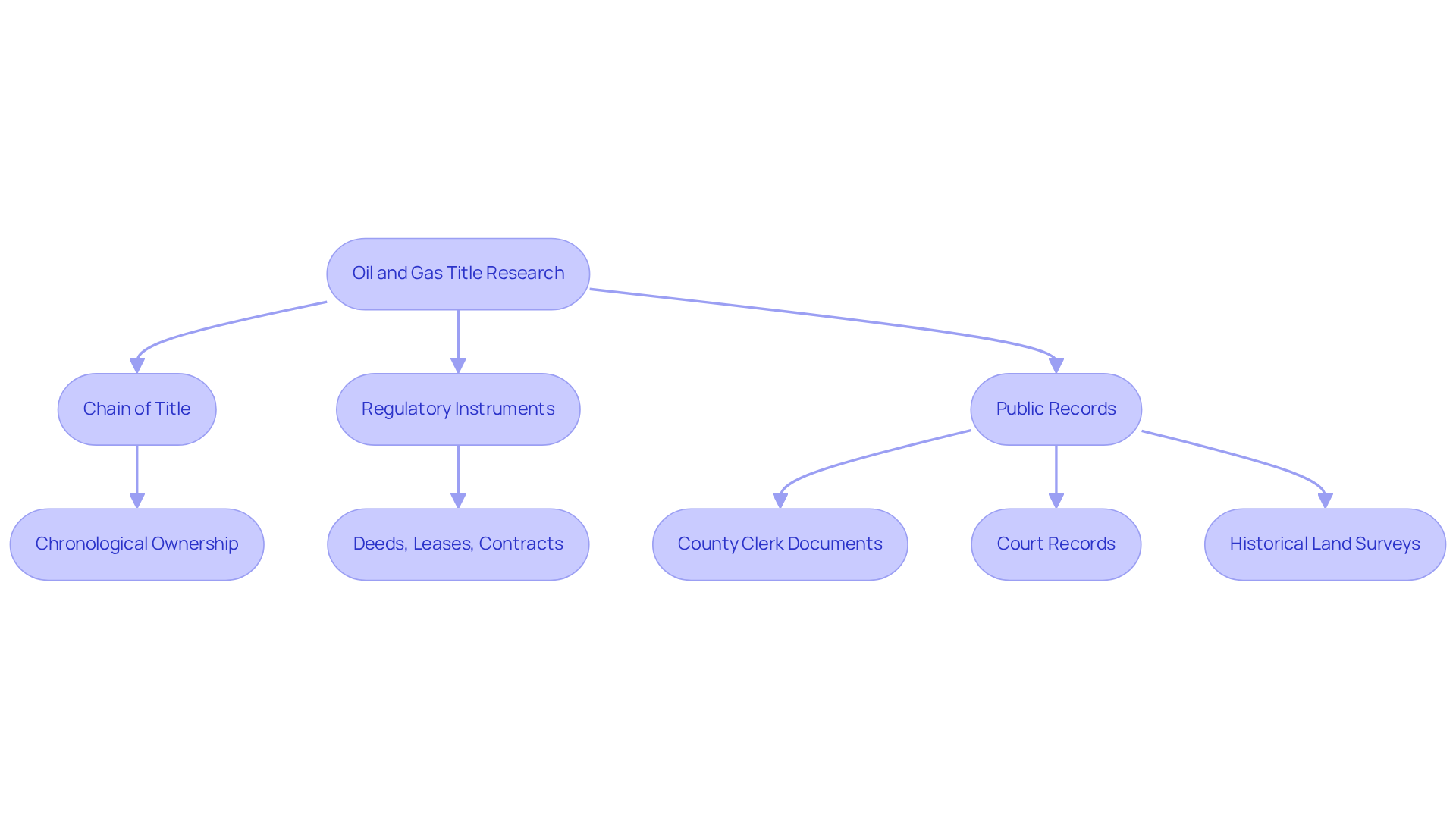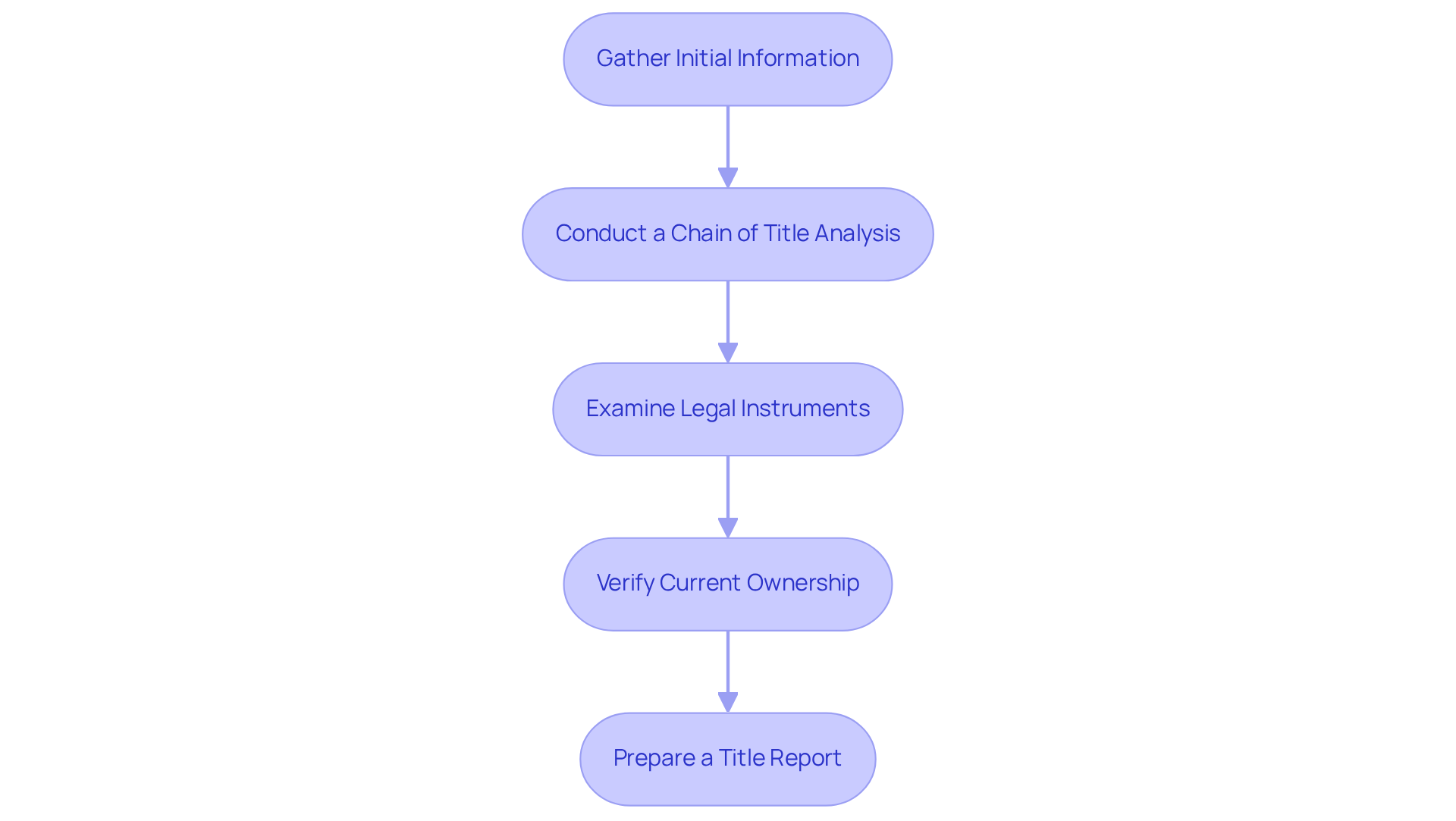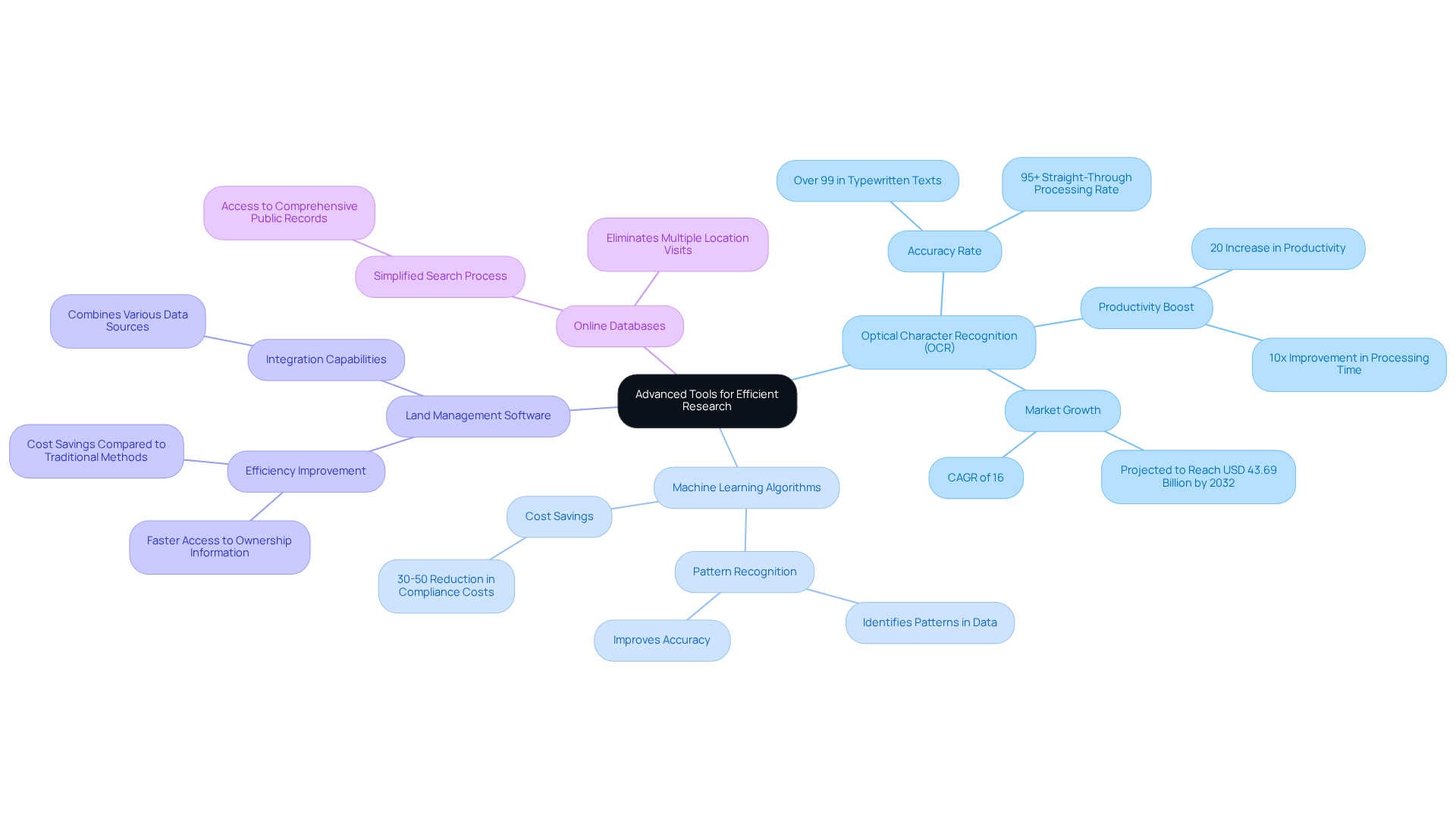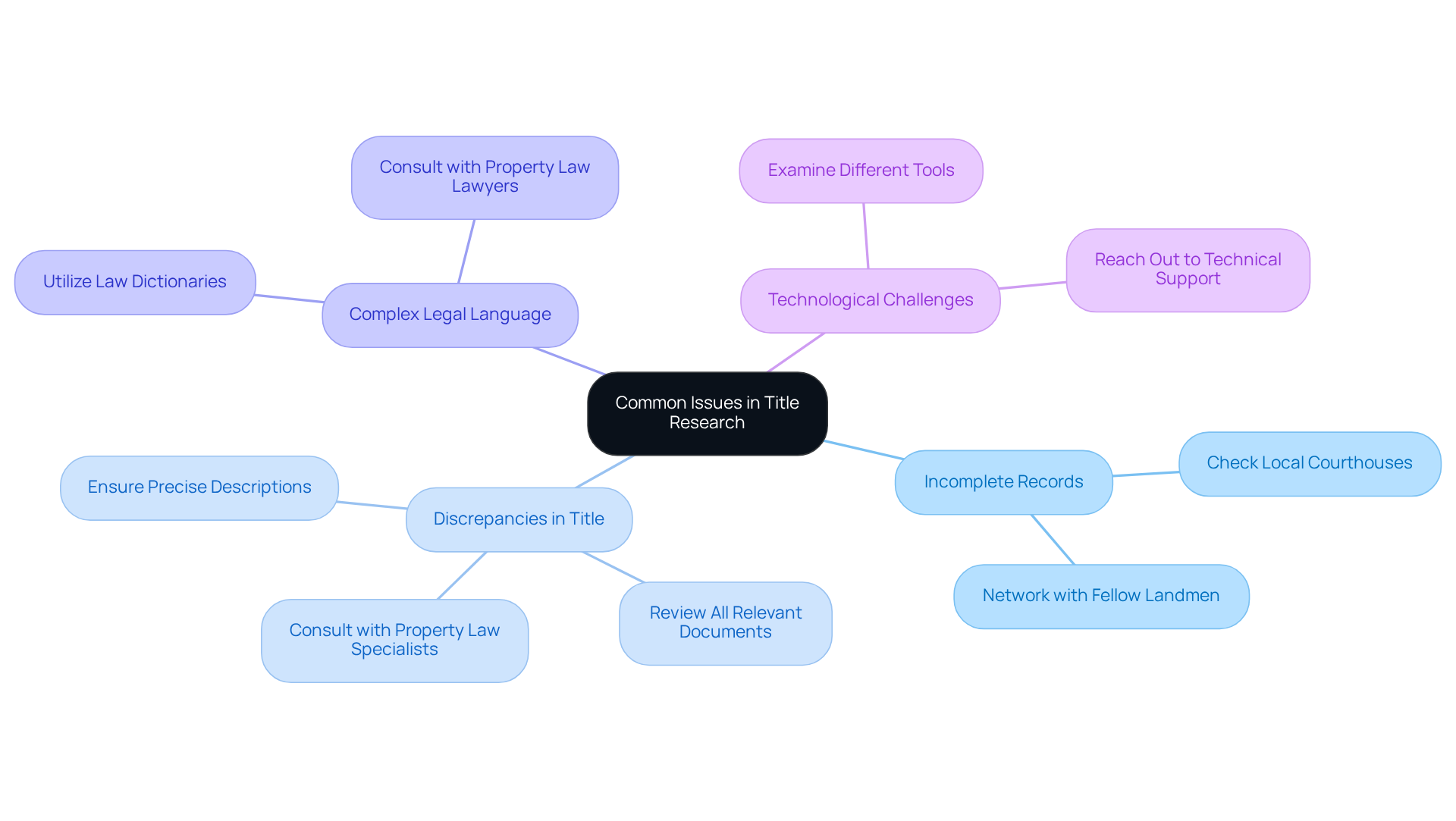Overview
Landmen conduct oil and gas title research through a systematic approach that encompasses:
- A detailed analysis of the chain of title
- Examination of legal instruments
- Verification of ownership against public records
This meticulous process is not merely procedural; it is essential for establishing accurate ownership claims and mitigating potential legal disputes. The article underscores the significance of thoroughness in this domain, while also highlighting the role of advanced technologies in enhancing research efficiency. Consequently, the integration of such technologies not only streamlines the research process but also bolsters the reliability of the findings, ultimately fostering trust among stakeholders.
Introduction
The intricate world of oil and gas title research is essential for ensuring that ownership rights are clearly defined and legally upheld. By comprehending the systematic approach that landmen employ to navigate this complex landscape, stakeholders can enhance their decision-making processes and protect their investments.
However, the challenge lies in the meticulous details and potential pitfalls that may arise during title examinations. How can one effectively mitigate these risks and streamline the research process?
This article explores the essential techniques and advanced tools that empower landmen to conduct thorough and efficient oil and gas title research, ensuring compliance and clarity in a competitive industry.
Understand the Basics of Oil and Gas Title Research
The meticulous process of oil and gas property examination involves understanding how landmen research oil and gas titles by analyzing the history of land possession and mineral rights to ascertain who holds the legal authority to extract resources. The significance of accurate title research, which highlights how landmen research oil and gas titles, cannot be overstated, as it lays the foundation for successful operations in the sector. Key components of this research include:
-
Chain of Title: This refers to the chronological sequence of ownership, tracing back to the original owner. A comprehensive understanding of how landmen research oil and gas titles is essential for confirming current possession and ensuring that all rights are accurately acknowledged. In the oil and gas industry, knowing how landmen research oil and gas titles can help create a well-documented chain of ownership that prevents disputes and facilitates smoother transactions. According to industry statistics, how landmen research oil and gas titles is crucial for upholding certainty and compliance, which can greatly affect investment security.
-
Regulatory Instruments: Furthermore, it is crucial to become acquainted with various official documents such as deeds, leases, and contracts that convey ownership rights. Each of these instruments plays a pivotal role in establishing legal claims and ensuring compliance with regulatory requirements. For example, a well-prepared oil and gas ownership opinion is crucial for safeguarding assets and maintaining operational efficiency. As one expert pointed out, 'Whether you are a mineral owner, a lessee, or an energy company, a well-prepared oil and gas ownership assessment is essential for protecting your assets and ensuring smooth operations.'
-
Public Records: Consequently, title investigation heavily depends on public records, which encompass county clerk documents, court records, and historical land surveys. Mastering how landmen research oil and gas titles is essential for conducting comprehensive ownership studies. For example, analyzing public records can reveal critical information about past ownership and any encumbrances that may affect current rights. A seasoned lawyer can perform detailed property investigations and create extensive ownership assessments, assisting in reducing risks and avoiding legal conflicts.
By mastering these foundational elements, you will be better prepared to understand how landmen research oil and gas titles, carry out thorough property investigations, mitigate risks, and avoid common pitfalls in the oil and gas sector. Moreover, comprehending the different kinds of oil and gas ownership opinions, such as Drilling Ownership Opinion and Division Order Ownership Opinion, can further improve your capacity to maneuver through the intricacies of ownership research.

Follow a Step-by-Step Process for Title Examination
To conduct a thorough title examination, it is imperative to adhere to the following structured steps:
- Gather Initial Information: Begin with the current owner's deed and any existing title opinions. This foundational data is essential for your research.
- Conduct a Chain of Title Analysis: Trace possession back through time, meticulously documenting each transfer. This process may require reviewing various documents and verifying their authenticity to ensure accuracy.
- Examine Legal Instruments: Scrutinize all relevant documents, including leases and contracts, to uncover any encumbrances or restrictions that may affect the property.
- Verify Current Ownership: Cross-check your findings with public records to validate the current ownership status, ensuring there are no inconsistencies that could lead to disputes. As mentioned, 'a single error in a property examination can lead to legal disputes and potentially foreclosure proceedings.'
- Prepare a Title Report: Compile your findings into a clear and concise report, emphasizing any issues that need resolution before proceeding with transactions. Keep in mind, 'depending exclusively on insurance is insufficient - the aim should consistently be to perform such a comprehensive examination that insurance serves as a safety net instead of a main defense.'
By following these steps, you can carry out a thorough property examination, which is essential for informed decision-making in real estate transactions. Precise property examinations not only safeguard lenders' investments by ensuring properties are free from encumbrances but also assist in preventing expensive legal conflicts. The significance of thoroughness in this process cannot be emphasized enough, as it protects the integrity of property ownership and boosts the reputation of ownership professionals in a competitive market. The ripple effect of mistakes in ownership assessments can lead to significant issues for property owners, underscoring the necessity of diligence in this critical process.

Utilize Advanced Tools and Technologies for Efficient Research
To enhance title research efficiency, consider integrating advanced tools and technologies that can significantly improve your workflow:
- Optical Character Recognition (OCR): Leverage OCR software to digitize and extract text from scanned documents, facilitating easier searches for relevant information. Current OCR tools achieve over 99% accuracy in typewritten texts, significantly reducing manual data entry errors. The OCR market is projected to grow to USD 43.69 billion by 2032, underscoring its increasing relevance in the industry.
- Machine Learning Algorithms: Implement machine learning tools capable of analyzing extensive datasets to identify patterns and anomalies in record entries. This approach not only improves accuracy but also streamlines the research process, with businesses adopting AI-driven technologies like OCR reporting a 20% boost in productivity.
- Land Management Software: Utilize platforms such as Parse AI, which integrate various data sources, enabling quicker access to ownership information and enhancing workflow efficiency. Parse AI's machine learning capabilities enable researchers to finalize abstracts and reports more swiftly, leading to significant cost savings compared to conventional methods.
- Online Databases: Access comprehensive online databases that compile public records, simplifying the search process and eliminating the need to visit multiple locations.
By integrating these technologies into your workflow, you can significantly improve the speed and precision of your document analysis, which ultimately enhances how landmen research oil and gas titles and leads to more informed decision-making in the oil and gas industry. Furthermore, as Jim Samuel noted, "OCR has proven to be a valuable technological process for tackling the important challenge of transforming non-machine-readable data into machine-readable data," emphasizing the importance of adopting these advanced tools. However, it is essential to be aware of OCR's limitations, such as challenges with poor image quality and cursive handwriting, which can affect its performance.

Troubleshoot Common Issues in Title Research
Common issues in title research include:
-
Incomplete Records: When faced with missing documents, it is essential to check with local courthouses or land offices for additional resources. Networking with fellow landmen can also yield valuable leads on locating elusive records, enhancing the chances of a comprehensive title search.
-
Discrepancies in Title: Conflicting title records necessitate a meticulous review of all relevant documents. Interacting with specialists can provide clarity on ownership rights, as they can offer insights into resolving discrepancies effectively. As observed by Nixon Daughtrey, "Each transaction requires precise descriptions to ensure mineral rights are properly conveyed and safeguarded." Resolving title discrepancies can take several weeks to several months, highlighting the time investment involved in addressing these issues.
-
Complex Legal Language: Legal documents often contain intricate language that can be challenging to interpret. Utilizing law dictionaries or consulting with lawyers specializing in property law can aid in a clearer understanding, ensuring that all terms and conditions are accurately interpreted.
-
Technological Challenges: Should you encounter issues with software or databases, it is advisable to reach out to technical support for assistance. Furthermore, examining different tools that might better suit your needs can assist in simplifying the investigation process. Mistakes in property descriptions can lead to expenses of thousands of dollars to rectify, highlighting the financial consequences of inaccuracies in ownership investigation.
By proactively addressing these common issues, including over conveyance and fraudulent transfers, and emphasizing how landmen research oil and gas titles through systematic legal description reviews, you can significantly enhance the reliability of your title research and mitigate the risk of costly mistakes.

Conclusion
Understanding how landmen research oil and gas titles is crucial for ensuring legal clarity and operational success in the industry. This article has outlined the essential steps and tools involved in this meticulous process, emphasizing the importance of thorough title examination and the integration of advanced technologies to enhance efficiency and accuracy.
Key points discussed include the foundational aspects of oil and gas title research, such as the chain of title, regulatory instruments, and the reliance on public records. The step-by-step approach to title examination highlights the necessity of:
- Gathering initial information
- Conducting detailed analyses
- Preparing comprehensive reports to safeguard investments
Furthermore, the integration of advanced tools like Optical Character Recognition and machine learning algorithms can significantly streamline the research process, offering landmen a competitive edge in their operations.
Ultimately, the significance of diligent title research cannot be overstated. By embracing best practices and leveraging modern technologies, professionals in the oil and gas sector can:
- Mitigate risks
- Avoid costly legal disputes
- Ensure compliance with regulatory requirements
This proactive approach not only enhances the reliability of title research but also contributes to the overall integrity of property ownership in the industry. Engaging with these insights empowers landmen and stakeholders alike to navigate the complexities of oil and gas title research with confidence and precision.
Frequently Asked Questions
What is the purpose of oil and gas title research?
The purpose of oil and gas title research is to examine the history of land possession and mineral rights to determine who holds the legal authority to extract resources, which is essential for successful operations in the sector.
What is a Chain of Title?
A Chain of Title refers to the chronological sequence of ownership of a property, tracing back to the original owner. It is crucial for confirming current possession and ensuring that all rights are accurately acknowledged, thereby preventing disputes and facilitating smoother transactions.
Why is accurate title research important in the oil and gas industry?
Accurate title research is important because it upholds certainty and compliance, which can greatly affect investment security and operational efficiency in the oil and gas industry.
What are regulatory instruments in the context of oil and gas title research?
Regulatory instruments include official documents such as deeds, leases, and contracts that convey ownership rights. These documents are pivotal in establishing legal claims and ensuring compliance with regulatory requirements.
How do public records contribute to title investigation?
Public records, which include county clerk documents, court records, and historical land surveys, are essential for conducting comprehensive ownership studies. They can reveal critical information about past ownership and any encumbrances affecting current rights.
What role does a seasoned lawyer play in oil and gas title research?
A seasoned lawyer can perform detailed property investigations and create extensive ownership assessments, which help reduce risks and avoid legal conflicts in the oil and gas sector.
What are the different types of oil and gas ownership opinions?
The different types of oil and gas ownership opinions include Drilling Ownership Opinion and Division Order Ownership Opinion, which help navigate the complexities of ownership research.




